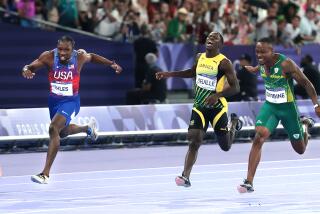BARCELONA ’92 OLYMPICS / DAY 11 : A Case of Morning Glory : After Disqualification, Men’s 10,000-Meter Winner Reinstated
- Share via
BARCELONA — At the Olympic Games, with their heightened sense of drama, a track stadium is also a political arena. A group of runners from many nations is also a map. Wherever flags fly, so too do national rivalries.
No race here has crystallized this more than the men’s 10,000 meters, run late Monday night. The winner, Khalid Skah of Morocco, was stripped of his medal 30 minutes after the finish because a teammate had unfairly aided him.
Less than 12 hours later, that decision was reversed. In an extremely rare development, an Olympic gold medalist was disqualified, then reinstated.
The cheers for the athletes have long been silenced, but the jeers are still reverberating.
The race pitted three nations that take their sports seriously--Morocco, Kenya and Italy--against one another. The same caprice brought together Skah and Richard Chelimo, the Kenyan, who, at least for a night, had a gold medal. By morning it had turned to silver, and Addis Abebe of Ethiopia dropped back into the bronze medal. Salvatore Antibo of Italy, who was second in this event in the 1988 Olympics, came away with nothing but fourth place.
The 25-lap race was on a fast pace with the two leaders running alone until the 23rd lap, when Chelimo and Skah came up on Hammou Boutayeb of Morocco, who had fallen a lap behind.
As Chelimo and Skah approached, Boutayeb glanced at his teammate, Skah, then surged ahead, cutting off Chelimo. The Kenyan was sandwiched between the Moroccan runners and tried several times, unsuccessfully, to get around Boutayeb.
At one point, a race official attempted to pull Boutayeb from the track, but the runner eluded him.
The crowd at Montjuic Stadium, which had been cheering and applauding the runners, grew restive and then angry at Boutayeb’s apparent tactic of interfering with Chelimo, who was passed by Skah.
To deafening boos and a shower of debris, the Moroccan blithely ran a victory lap, blowing kisses to the incensed crowd. The three Kenyans in the race jogged around the track sedately with their country’s flag.
After the race, chaos developed. Chelimo approached Boutayeb and said: “What you did is not good.”
Boutayeb did nothing but smile broadly. Upon seeing Boutayeb, Skah launched into a blistering rebuke. Boutayeb stared at the ground and said nothing.
Soon it was judged that Skah was disqualified, having violated the rules of the International Amateur Athletic Federation, the international governing body of track and field.
IAAF Rule 143.2 states: “No competitor shall receive assistance during the progress of an event. Assistance is the conveying, by any means, of advice, information or direct help and includes pacing.”
An hour later, Skah was outside the stadium, still wearing his running uniform. “They have taken my life,” he wailed, nearly hysterical with anger and disbelief.
Tuesday morning, a 12-member jury ruled that Skah had not been aided by the tactics of Boutayeb. Upon hearing the news, the Kenyans immediately appealed the jury’s decision. The IAAF denied the appeal, saying competitive decisions cannot be overturned.
Isaiah Kiplagat, head of the Kenyan delegation, said that “the credibility of the entire future of middle- and long-distance running worldwide is in jeopardy. Consequently, we reserve the right to take whatever other action our delegation may deem necessary.”
Kiplagat did not say what further action Kenya might take, but earlier in the day, the head of the Italian delegation, Mario Pescante, indicated in a letter that a boycott of the 5,000 meters was being discussed.
“If they decide to do that, we (Italy) will follow,” Pescante said.
Four of the top five finishers in the 10,000 are entered in the 5,000--Skah, Abebe, Antibo and Arturo Barrios of Mexico, the 10,000 world record-holder.
The controversial situation was exacerbated by the athletic history shared by the runners’ nations and the runners themselves. Monday was not the first time they had clashed.
Among some Italians, there is a sentiment against Moroccans, who are seen as carpetbaggers who come to Italy and take jobs from Italians.
Morocco and Kenya, aside from being in the same continent, have little in common. One is an Islamic kingdom, the other a Christian democracy. The two nations battled at the World Cross-Country Championships in Boston last March, when Skah was also involved.
The Moroccan was one of the race favorites, having won the title in 1990 and 1991, but faced a challenge from a strong team of Kenyans. John Ngugi of Kenya won easily as his nation took five of the top eight places and won its seventh consecutive team title.
Skah placed fourth, Chelimo fifth.
After the race, Skah complained that the Kenyans had ganged up on him, kicked him while running in a pack, and used unsportsmanlike tactics.
Skah made the same complaint at last year’s World Championships in Tokyo. In the 10,000 meters there, the gold medal went to Moses Tanui of Kenya, the silver to Chelimo and the bronze to Skah. After the race, Skah said a third Kenyan had sought to throw off his rhythm by running with him and changing speeds frequently.
Going back even further, the medals in the men’s 10,000 at the 1988 Seoul Games had been awarded in this order: gold to Moulay Boutaib of Morocco, silver to Antibo of Italy, bronze to Kip Kimeli of Kenya.
At Seoul, Antibo bolted to the lead, running at a reckless pace for half a mile while the rest of the field followed, bewildered. The Italian eventually slowed to a more sensible pace, but during the middle of the race became disoriented. He continued racing, but appeared to become confused and ran erratically, despite his second-place finish.
Subsequently, it was revealed that a brain tumor had caused Antibo’s erratic strategy at the 1988 Games.
After several months of therapy, Antibo resumed training and became an inspirational hero to the Italians.
Monday, when the public address announcement was made that Skah had lost the gold medal, thus elevating Antibo to third place, there was pandemonium among the Italian fans.
“It was not that he won the bronze medal, that is nothing,” said Franco Fava, a sportswriter for Corriere Sport, an Italian daily. “The thing for most Italians was that Antibo was the first non-African placer.”
More to Read
Go beyond the scoreboard
Get the latest on L.A.'s teams in the daily Sports Report newsletter.
You may occasionally receive promotional content from the Los Angeles Times.








